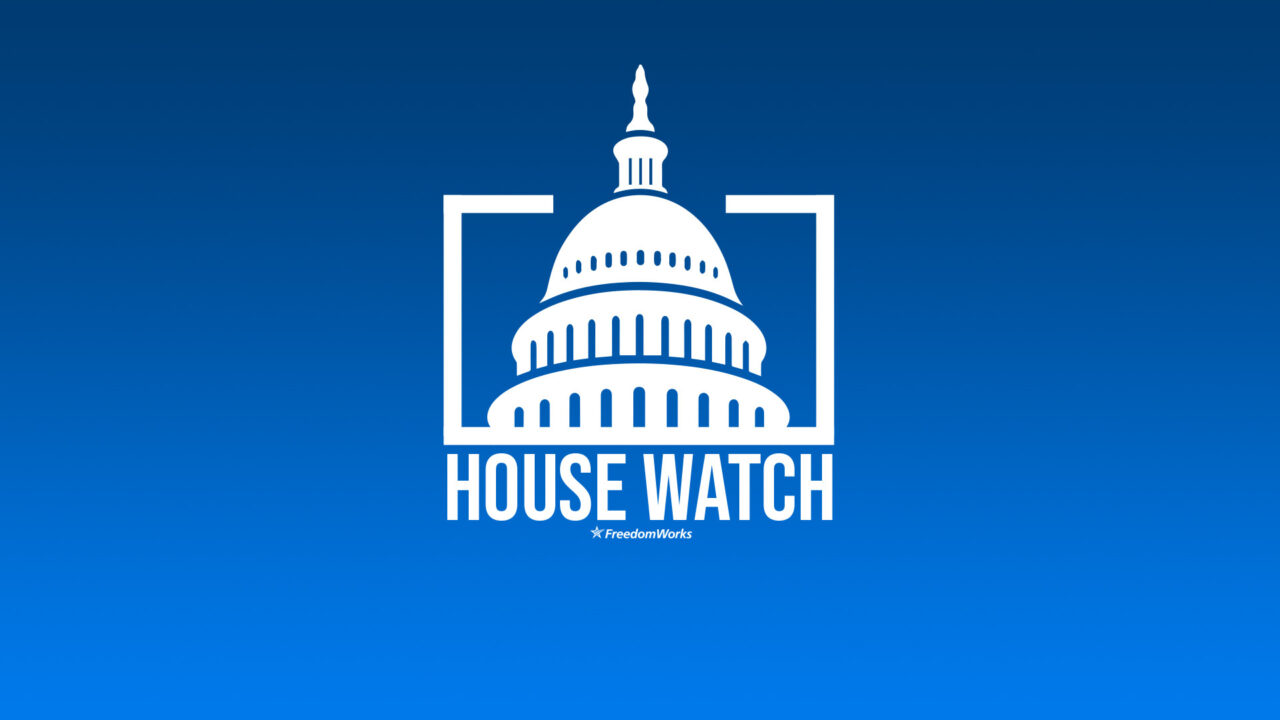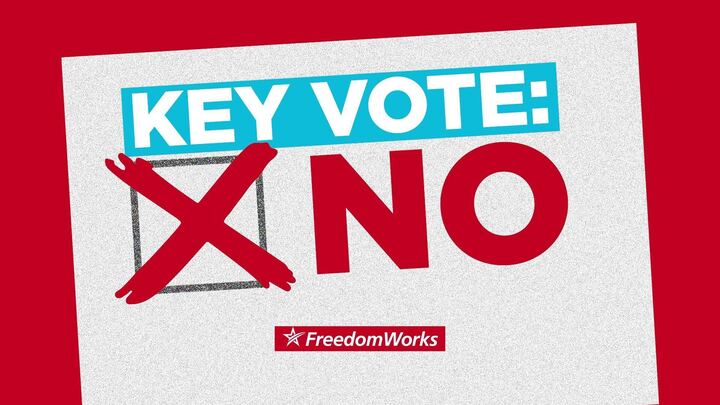House Watch – February 27, 2023

 Welcome to the latest edition of House Watch, where FreedomWorks informs activists and partners on upcoming House votes.
Welcome to the latest edition of House Watch, where FreedomWorks informs activists and partners on upcoming House votes.
The House is back in session this week for the first of two weeks. A major focus will be digital communications bills, a resolution on the earthquakes that have devastated Turkey and Syria, a bill that would address inflation, and a resolution that overturns a Labor Department rule allowing ESG considerations in 401(k) investments.
The Senate is also in session this week and will focus on nominations.
The following bills will be considered under suspension of the rules:
H.R. 1059: Securing And Enabling Commerce Using Remote And Electronic Notarization Act Of 2023 (Rep. Kelly Armstrong (R-N.D.-AL)/ Committee on Energy and Commerce)
Background: There is no nationwide standard for how and when someone can use remote or electronic notaries.
This bill would authorize notaries public to perform and establish minimum standards for electronic notarizations and remote notarizations in interstate commerce. It would also require any Federal court or state to recognize notarizations performed by a notary in any state when the notarization affects interstate commerce, a judicial proceeding, record, or public act.
Relevant Info: This bill passed the House last Congress.
Background: A study conducted by Northeastern University in 2018 found that some devices and apps can take pictures or record users without the user knowing and then share the information collected with third parties. This bill would not cover devices where users have a reasonable expectation that they will be recorded or photographed.
This bill would require the manufacturers of internet-connected devices to disclose to consumers if the device has a camera or microphone. The bill excludes smartphones, laptops, tablets, or any device that is specifically marketed as a camera. The bill requires the Federal Trade Commission (FTC) to oversee the enforcement of the bill.
Relevant Info: This bill was introduced last Congress, but it did not get a vote in the House.
Background: As of 2022, nearly 60% of Americans had a smartphone. To better protect consumers’ data and privacy, Congress is trying to better understand the vulnerabilities in smartphone networks.
This bill would require the National Telecommunications and Information Administration to examine and report on the cybersecurity of mobile service networks and the vulnerability of these networks and mobile devices to cyberattacks and surveillance conducted by adversaries. The report shall include (1) an assessment of the degree to which providers of mobile service have addressed certain cybersecurity vulnerabilities; (2) a discussion of the degree to which these providers have implemented cybersecurity best practices and risk assessment frameworks; and (3) an estimate of the prevalence and efficacy of encryption and authentication algorithms and techniques used in mobile service and communications equipment, mobile devices, and mobile operating systems and software.
Relevant Info: This bill passed the House last Congress by a vote of 404-19.
Background: The authority of the Federal Communications Commission (FCC) to grant licenses and permits for spectrum bands through competitive bidding expired in December 2022 (except for certain spectrum bands that expire at a later date).
This bill would extend the FCC’s authority for spectrum auctions to May 19, 2023.
Background: On February 6, 2023, a 7.8 magnitude earthquake struck Turkey and Syria, killing more than 43,000 people in Turkey and another 5,500 people in Syria. More than 164,000 buildings have been destroyed as a result of the earthquake. The region also experienced another 6.4 magnitude earthquake weeks later.
In this resolution, the House would mourn the loss of life in Türkiye and Syria caused by earthquakes in early February; express its deep condolences to the families of the earthquake victims; applaud the work of humanitarian aid and rescue workers on the ground to save lives and provide care for victims; applaud the response to the tragedy by the U.S. government, other governments, and nongovernmental organizations; applaud the civilians of Türkiye and Syria who have volunteered to assist with the response; urge the international community to support the disaster response in both countries; condemn the efforts by Assad regime to exploit the disaster to evade international pressure and accountability; call for an increased oversight mechanism to ensure that U.S.-provided assistance is not being diverted to benefit the Assad regime; and urge the Biden administration to remain committed to protecting the Syrian people.
The following bills would be considered pursuant to a rule:
Background: According to Peter C. Earle, an economist at the American Institute for Economic Research, inflation is up more than 13% since President Biden took office. Real wages are lower today than they were both a full year ago and at the beginning of Biden’s presidency in January 2021. That’s because inflation was so high in 2021 and the beginning of 2022.
This bill would require the Director of the Office of Management and Budget and the Chair of the Council of Economic Advisors to prepare a statement estimating the inflationary impact of any executive order the President signs, including whether the order is determined to have no significant inflationary impact, quantifiable inflationary impact, or likely to have a significant inflationary impact on the consumer price index; or the order will likely have a significant inflationary impact, but the amount can’t be determined at the time of the report. The President would submit to the House and Senate an inflation-impact report on each executive order no later than 180 days after enactment and every year thereafter.
FW View: As the House and Senate prepare to vote on raising the debt limit, farm bill, government funding, and more Ukraine aid, among other things, we encourage them to also produce reports on the inflationary effects of these federal programs.
Background: The Department of Labor (DOL) implemented a rule late last year to make it easier for employers to consider environmental, social, and governance (ESG) factors when choosing 401(k) plan investments. The rule overturns a Trump administration rule that restricted retirement plan decision-makers (fiduciaries) to using only financial factors in choosing investments. So-called ESG funds generally charge higher fees and offer lower returns. Moreover, researchers at Columbia University and the London School of Economics found ESG funds may not even be achieving their goals. The study compared the ESG records of American companies in 147 ESG fund portfolios to ones in over 2,000 non-ESG portfolios and found that the ESG companies were often worse when it came to labor and environmental law compliance.
This resolution states that Congress disapproves the rule adopted by the Department of Labor on the “Prudence and Loyalty in Selecting Plan Investments and Exercising Shareholder Rights” and that the rule would have no force or effect.
Congressional Review Act: This resolution falls under the Congressional Review Act, which allows Congress to overturn regulations that the executive branch has adopted. The resolution must be passed by the House and Senate, and signed by President Biden, to block the DOL rule.
FW View: FreedomWorks supports this bill and believes that these ESG standards place this left-wing social justice agenda ahead of companies’ and investment firms’ fiduciary responsibility to their shareholders and clients. FreedomWorks has also been critical of the DOL rule, saying that it would “permit and even tacitly encourage portfolio managers at firms such as BlackRock to violate their fiduciary duty to their clients by allowing ESG factors to trump sound investment decisions.”
Sign Up for House Watch Alerts
"*" indicates required fields









